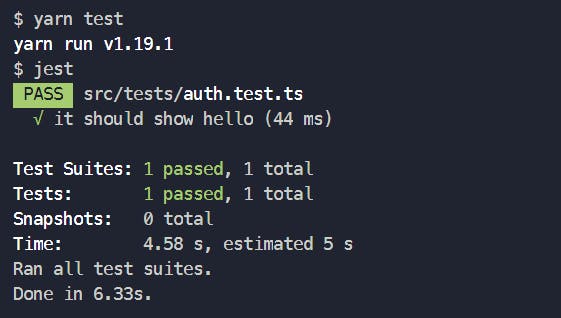[ PART 2 ] Create a Twitter clone with GraphQL, Knex, Typescript, and React ( Setup Tests )
Table of contents
Setting up the tests
I will use jest for testing and this will be a first for me being more used to mocha + chai. I could change to ava eventually if I don't like jest ;).
The jest library is already installed, I'm going to install ts-jest since I use typescript and it's the easiest way to set up everything.
yarn add -D ts-jest
yarn ts-jest config:init
package.json
"scripts": {
"dev": "nodemon src/index.ts --exec ts-node",
"build": "shx rm -rf dist/ && tsc -p .",
"start": "node dist/src/index.js",
"test": "jest"
},
Since I'm going to reuse my server for testing, I'm going to extract it into another file.
src/server.ts
import 'reflect-metadata'
import { ApolloServer } from 'apollo-server'
import { buildSchema } from 'type-graphql'
import AuthResolver from './resolvers/AuthResolver'
const createServer = async () => {
return new ApolloServer({
schema: await buildSchema({
resolvers: [AuthResolver],
}),
})
}
export default createServer
And as a result, my index.ts file becomes
src/index.ts
import dotenv from 'dotenv'
import path from 'path'
import createServer from './server'
dotenv.config({
path: path.join(__dirname, `../.env.${process.env.NODE_ENV}`),
})
const main = async () => {
const server = await createServer()
server.listen().then(({ port }) => {
console.log(`Listening on port ${port}`)
})
}
main()
In my src directory, I create a tests directory and 2 files, setup.ts and auth.test.ts.
I will also need the apollo-server-testing library
yarn add -D apollo-server-testing
src/tests/setup.ts
import createServer from '../server'
import { createTestClient } from 'apollo-server-testing'
export const testClient = async () => {
const server = await createServer()
return createTestClient(server)
}
src/tests/auth.test.ts
import { gql } from 'apollo-server'
import { testClient } from './setup'
const TEST = gql`
query {
me
}
`
test('it should show hello', async () => {
const { query } = await testClient()
const res = await query({ query: TEST })
expect(res.data.me).toEqual('Hello')
})

Looks like it's working, we can finally start having fun :D
The next part will be about Authentication ;).
Have a nice day! ;)
You learned 2-3 things and want to buy me a coffee ;)? https://www.buymeacoffee.com/ipscoding
![[ PART 2 ] Create a Twitter clone with GraphQL, Knex, Typescript, and React ( Setup Tests )](https://cdn.hashnode.com/res/hashnode/image/upload/v1680179513827/dd589354-5931-49e6-8850-07a96054fc1e.jpeg?w=1600&h=840&fit=crop&crop=entropy&auto=compress,format&format=webp)